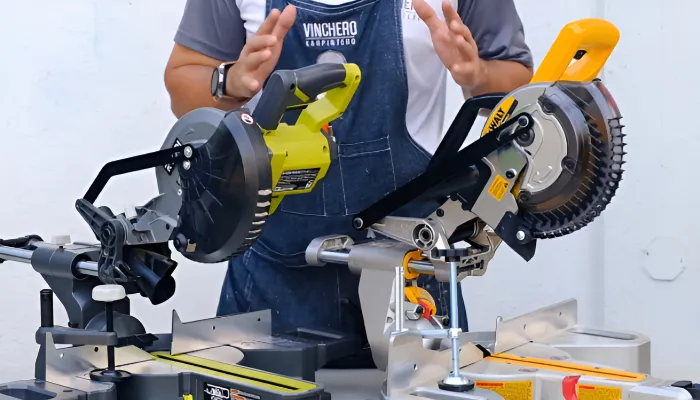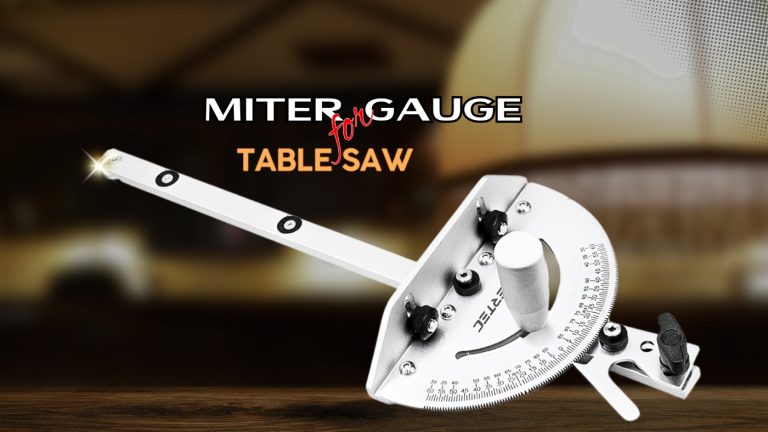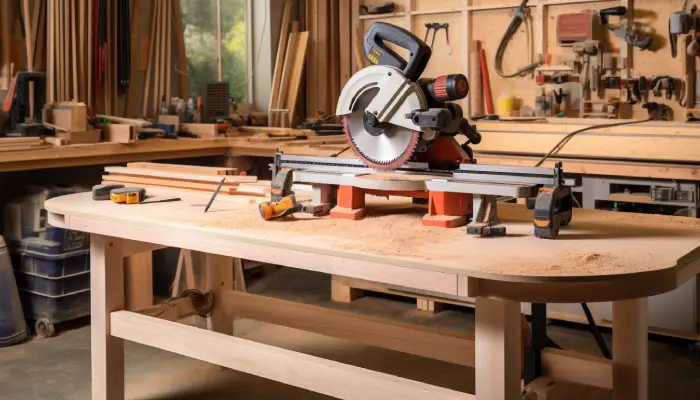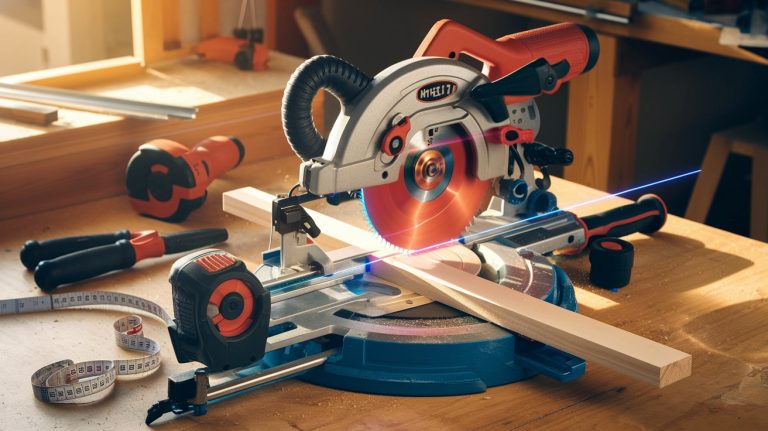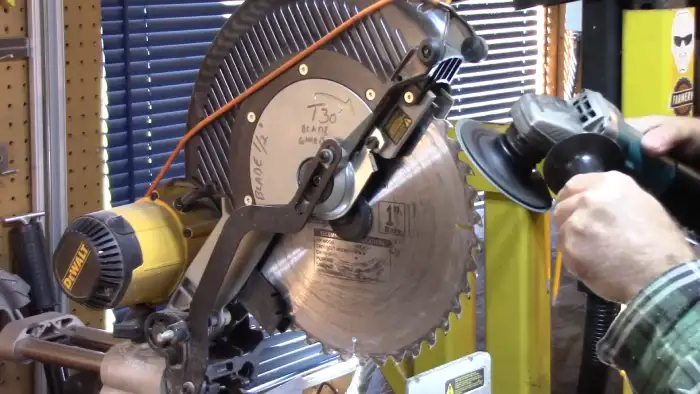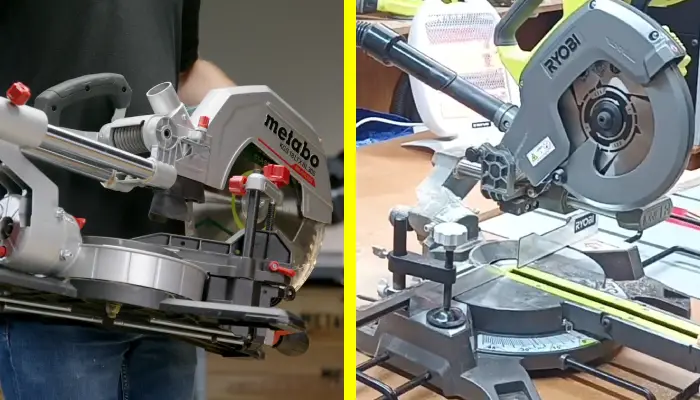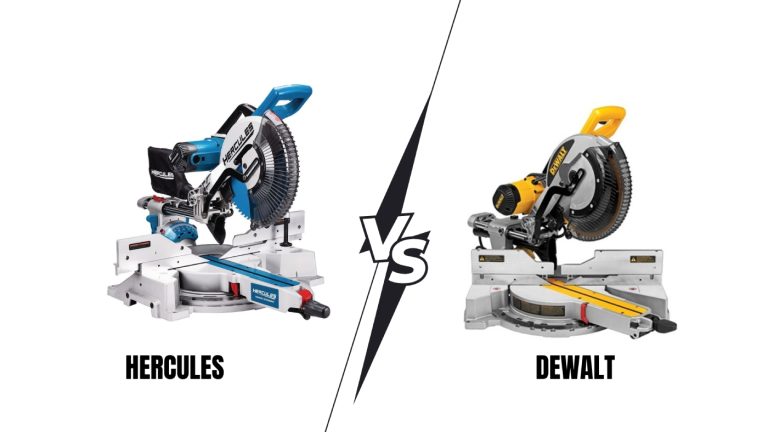Ryobi vs Dewalt Miter Saw: Comparison Across 6 Categories
Ryobi and DeWalt’s miter saw brings the world of woodworking into your hands, each with its own set of advantages and unique features.
As you venture into the realm of precision cuts and craftsmanship, it’s essential to weigh the differences between these two renowned brands of saw tool.
One differentiating factor lies in the cutting precision. Ryobi miter saws come equipped with laser cutting guides, enhancing accuracy for tasks that demand precision.
Conversely, DeWalt miter saws have features like stainless steel detent plates with multiple positive stops, enabling accurate angle cuts up to 90 degrees. Also, in terms of motor power, the DeWalt models are more powerful than the Ryobi models.
We will discuss the differences between Ryobi and Dewalt Miter Saws so that you can choose the best one for your needs.
Differences Between Ryobi vs Dewalt Miter Saw: 6 Comparison
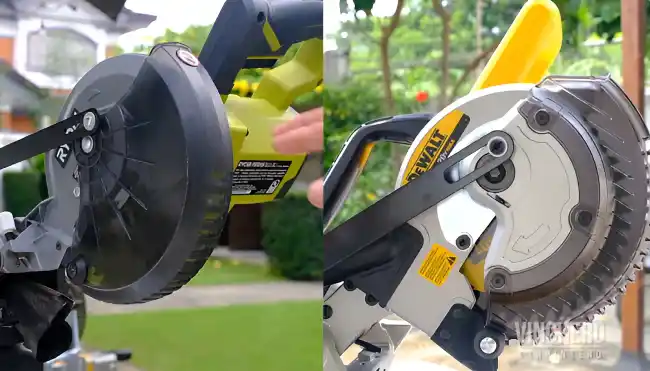
In some categories, Ryobi and Dewalt miter saws differ from one another. The following are among them:
1. Cutting Precision
Regarding cutting precision, both Ryobi and DeWalt miter saws offer features that enhance accuracy.
But, if you require higher precision, DeWalt miter saws are generally considered the better choice. With stainless steel detent plates and multiple positive stops,
DeWalt miter saws are designed to provide accurate angle cuts up to 90 degrees, making them the preferred choice for intricate woodworking tasks.
On the other hand, Ryobi miter saws feature laser cutting guides that aid in achieving precise cuts, making them ideal for tasks that require accuracy but are not as complex.
2. Motor Power
Both brands offer powerful motors that deliver the strength needed for various woodworking tasks. However, there are notable differences in the motor power between Ryobi and DeWalt miter saws.
Ryobi miter saws are designed for typical homeowner and DIY projects, with motors ranging between 10 to 15 amps. These motors provide sufficient power for average woodworking tasks.
On the other hand, DeWalt miter saws feature more robust motor power, consistently at 15 amps. This higher motor power allows DeWalt saws to generate high RPMs, offering the strength needed for precise cuts and handling tougher materials.
The increased motor power of DeWalt miter saws gives them an edge for more demanding applications, making them a preferred choice for professionals and serious woodworkers.
3. Durability
In terms of durability, both Ryobi and DeWalt offer highly robust and reliable miter saws. But Ryobi Miter saws stand out in this aspect, with their products built to last for generations. Their compact designs also do not compromise the overall sturdiness of the product.
While DeWalt has a long-standing reputation for quality engineering, their miter saws’ durability is just a little behind, and they are designed to withstand heavy-duty usage.
4. Portability
Ryobi miter saws are known for their lightweight and compact designs, making them a great option for homeowners and users with limited workspaces. They are relatively easy to move around, allowing you to take them wherever you need to work.
On the other hand, DeWalt miter saws are also designed with portability in mind. Although they may not be as lightweight as some Ryobi models, they are still favored by professionals who need to transport their tools to various job sites.
5. Cutting Capacity
When considering cutting capacity, it’s important to look at the range of board sizes and angles these saws can handle. Both Ryobi and DeWalt miter saws offer decent cutting capacities, but there are some differences to note:
- Ryobi miter saws can handle a range of board sizes and angles suitable for common woodworking tasks and projects.
- DeWalt miter saws excel in cutting capacity, especially their sliding compound models. The sliding functionality allows them to cut larger and wider boards, giving them an advantage when working on more extensive projects.
- The ability to make precise angled cuts is crucial, and both brands deliver in this aspect. Ryobi miter saws offer adjustable miter stops for accurate angle cuts, while DeWalt miter saws come with a miter detent override that allows you to override the preset angles and make precise adjustments.
6. Price Range
Both brands offer miter saws in different price ranges to accommodate various budgets and preferences. Ryobi miter saws are generally more affordable, making them suitable for homeowners and casual users.
They provide good value for money and are ideal for DIY enthusiasts who want a reliable tool without breaking the bank.
On the other hand, DeWalt miter saws are positioned in a slightly higher price range due to their advanced features, build quality, and precision.
These saws are designed for professionals who require a high-performance tool that can withstand heavy use and deliver accurate cuts consistently.
While they may come with a higher price tag, DeWalt miter saws offer superior durability and precision, making them worth the investment for serious woodworkers.
Ryobi vs Dewalt Miter Saw Comparison Table
| Criteria | Ryobi Miter Saw | DeWalt Miter Saw |
| Cutting Precision | Laser cutting guide for improved accuracy | Multiple positive stops on stainless steel detent plates |
| Motor Power | Typically 10 to 15 amps for average tasks | Consistently powerful 15-amp motors |
| Durability | Built to last with a compact robust design | Long-lasting, engineered for heavy-duty use |
| Portability | Lightweight and compact for easy movement | Designed for portability, suitable for job sites |
| Cutting Capacity | Suitable for common woodworking tasks | Excellent cutting capacity, sliding models available |
| Price Range | Generally more affordable for DIY users | Positioned at a slightly higher price range |
Ryobi or DeWalt Miter Saw: Which Option Should You Select?
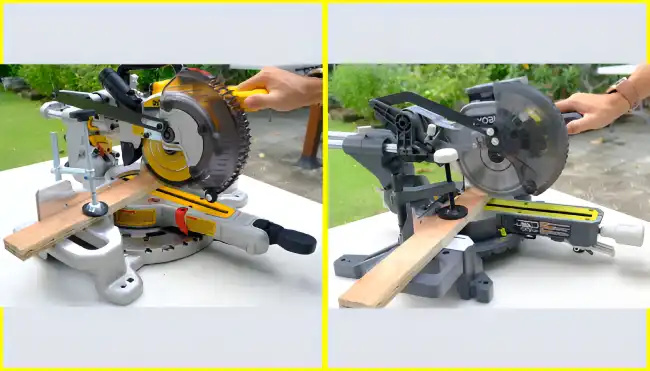
After reading the Ryobi vs. DeWalt miter saws, the choice ultimately depends on your specific needs and preferences.
If cutting precision is a top priority and you’re engaged in intricate woodworking tasks, DeWalt might be the better choice with its renowned accuracy, stainless steel detent plates, and consistent 15-amp motors.
Despite the slightly higher price range, professionals looking for a reliable tool to handle demanding projects could benefit from DeWalt’s durability and precision.
On the other hand, if you’re a DIY enthusiast or a homeowner with occasional woodworking needs, Ryobi miter saws offer a cost-effective solution. Their laser cutting guides and compact designs suit standard woodworking tasks.
Ryobi saws’ lightweight and portable nature could be advantageous if you have a limited workspace or need to move the tool around frequently.
Consider the specific features, cutting capacities, and intended usage to make the best decision for your woodworking projects.
What size is the arbor on a 12-inch Dewalt miter saw?
The arbor size on a 12-inch DeWalt miter saw blade, such as the DEWALT 12-Inch Miter Saw Blade with 80 teeth, is 1 inch.
This standardized arbor size ensures compatibility with most 12-inch miter saws, allowing for secure and precise blade installation.
The 1-inch arbor diameter is a common specification in the industry, facilitating ease of blade changes and providing stability during cutting operations.
Are Ryobi miter saw blades interchangeable
Ryobi miter saw blades are generally interchangeable as long as they match the blade diameter and arbor size specified for the particular Ryobi miter saw model.
Most Ryobi miter saws have standardized blade sizes, such as 10 inches, and utilize common arbor sizes like 5/8 inches.
Ensure that the replacement blade’s diameter and arbor size match the manufacturer’s recommendations for the specific miter saw model.
Also, considering the cutting task type and the blade’s tooth count is essential for achieving optimal performance.
Always refer to the miter saw’s user manual or manufacturer’s guidelines to confirm compatibility and make informed decisions when replacing or upgrading miter saw blades.
How wide of the board can a DeWalt miter saw cut?
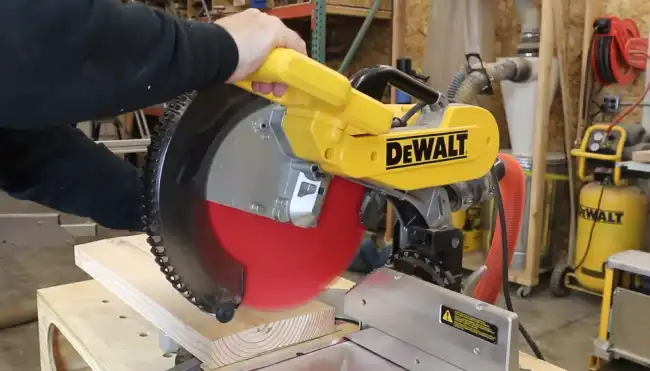
A DeWalt miter saw with a 12-inch blade can cut boards and panels that are up to 14 inches wide when the saw is set to a 90-degree angle.
When the saw is set to a 45-degree angle, it can cut boards up to 10 inches wide. This capability allows for versatility in handling various woodworking projects, accommodating different widths of materials for precise cuts.
The miter saw’s adjustable miter detent plate further enhances its usability, enabling users to adjust the saw’s settings quickly while maintaining accuracy in their cuts.
Find Your Perfect Miter Saw and Fulfill Your Woodworking Plans
When you embark on your woodworking journey, the choice between Ryobi and DeWalt miter saws boils down to your specific needs.
If your focus is on intricate precision and accurate angle cuts, DeWalt’s stainless steel detent plates and robust motors offer the edge. For the casual woodworker or DIY enthusiast, Ryobi’s laser cutting guides and affordability might be your go-to.
Both brands ensure durability and portability, catering to different workspace and project requirements. Whether you’re crafting in your garage or on a professional job site, remember that the right choice lies in the details, a tool designed to match your aspirations.

